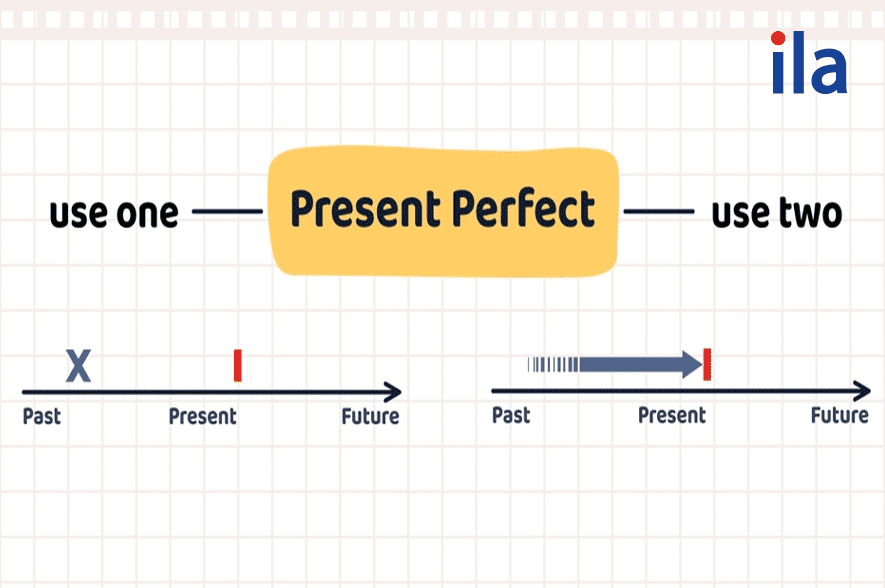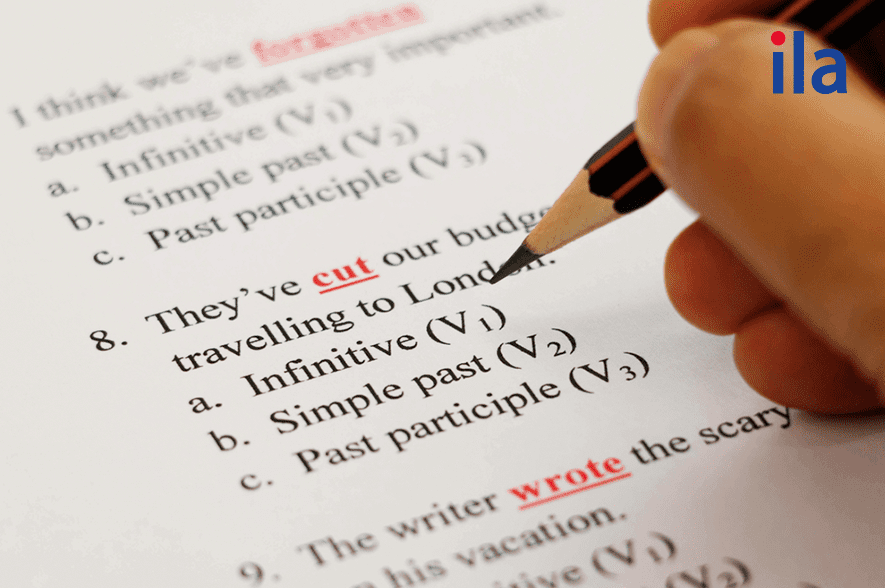Rewriting sentences from the Simple Past to the Present Perfect is a common exercise in tests. In this article, ILA will guide you through the detailed steps of converting the past simple to the present perfect, along with practice exercises and answers. Let’s get started!
How to Convert Simple Past to Present Perfect
1. Type 1 – Changing from Simple Past to Present Perfect
Simple Past: S + V2 + time + ago
Present Perfect: S + have/has + V3 + for + time
Example:
• I received his letter a week ago.
→ I have received his letter for a week.
2. Type 2 – Using “The last time” Structure
• It’s + time … + since … + last + V2
• S + last + V2 + time + ago
• The last time + S + V-ed + was + time + ago
Present Perfect: S + haven’t/hasn’t + V3 + for + time
Example:
• The last time I saw Mai was three years ago.
→ I haven’t seen Mai for three years.
3. Type 3 – Converting Question Structures
• When did + S + V-infinitive?
• When was the last time + S + V2?
Present Perfect: How long + have/has (not) + S + V3?
Example:
• When did he buy that car?
→ How long has he had that car?
To reinforce what you’ve learned, try rewriting sentences from the Simple Past to the Present Perfect in the practice exercises at the end of this article!
Difference Between Simple Past and Present Perfect
Before diving deeper into how to convert Simple Past to Present Perfect, let’s review the key differences between these two tenses.
1. Definition of Simple Past and Present Perfect
The Present Perfect is used to describe an action or event that happened in the past but continues into the present and may continue in the future.
Examples:
• Becky has been working as a doctor for over 10 years.
• I have just finished my essay.
• They have recently married.
On the other hand, the Simple Past is used to describe an action, event, or phenomenon that happened and ended in the past.
Examples:
• She lived in Da Nang for ten years.
• I visited Hanoi last winter.
• I saw Anna this morning.
• Becky moved to this city a year ago.
2. Detailed Structural Differences Between Simple Past and Present Perfect
To successfully complete exercises on converting Simple Past to Present Perfect, you need to understand their fundamental structures:
|
Sentence Type |
Present Perfect |
Simple Past |
|
Affirmative |
S + have/ has + been + adj/N |
S + was/ were + adj/N |
|
Negative |
S + have/ has + NOT + been + adj/N |
S + were/ was + NOT + adj/N |
|
Yes/no question |
Have/ Has + S + been + adj/N? |
Were/ Was + S + adj/N? |
|
Wh-word + have/ has + S + (not) + been + adj/N? |
Wh-word + were/ was + S + (not) + adj/N? |
|
|
Regular Verbs |
||
|
Sentence Type |
Present Perfect |
Simple Past |
|
Affirmative |
S + have/ has + Vpp + (O) |
S + V2/ed + (O) |
|
Negative |
S + have/ has + NOT + Vpp + (O) |
S + did NOT + Vbare + (O) |
|
Yes/no question |
Have/ Has + S + Vpp + (object)? |
Did + S + V-infinitive + (O)? |
|
Wh-question |
Wh-word + have/ has + S + (not) + Vpp + (O)?+ S + (not) + been + adj/N? |
Wh-word + did + S + (not) + V-infinitive + (O)? |
Formulas for Converting Simple Past to Present Perfect
There are three ways to convert Simple Past to Present Perfect:
1. Basic Conversion Formula
| Simple Past: S + V2 + time + ago → Present Perfect: S + have/has + V3 + for + time |
Examples:
• Simple Past: My sister moved to Tokyo three years ago.
→ Present Perfect: My sister has moved to Tokyo for three years.
• Simple Past: They finished their project two weeks ago.
→ Present Perfect: They have finished their project for two weeks.
• Simple Past: He bought a new car two months ago.
→ Present Perfect: He has bought a new car for two months.
• Simple Past: We completed the marathon three days ago.
→ Present Perfect: We have completed the marathon for three days.
2. Using “The Last Time” Structure
| Simple Past: It’s + time ….+ since …+ last + V2 S + last + V2 + time + ago The last time + S + V-ed + was + time + ago → Present Perfect: S + haven’t/hasn’t + V3 + for + time |
Examples:
• Simple Past: It’s been three years since I last saw her.
→ Present Perfect: I haven’t seen her for three years.
• Simple Past: He last traveled to Japan two decades ago.
→ Present Perfect: He hasn’t traveled to Japan for two decades.
• Simple Past: The last time I visited this city was five years ago.
→ Present Perfect: I haven’t visited this city for five years.
3. Converting Questions from Simple Past to Present Perfect
| Simple Past: When did + S + V-infinitive? When was the last time + S + V2? Present Perfect: How long + have/has (not) + S + V3? |
Examples:
• Simple Past: When did you start learning English?
→ Present Perfect: How long have you been studying English?
• Simple Past: When did she buy that car?
→ Present Perfect: How long has she had that car?
• Simple Past: When did they leave the party?
→ Present Perfect: How long have they been away from the party?
Tips for Rewriting Sentences in the Present Perfect Tense
Besides knowing how to convert Simple Past to Present Perfect, you can follow these steps to tackle sentence transformation exercises effectively.
Step 1: Read and Understand the Original Sentence
Understanding the meaning of the original sentence will help you avoid mistakes when rewriting it.
Step 2: Identify Sentence Components
Determine the subject, verb, and object in the sentence before making any changes.
Step 3: Rewrite the Sentence in the Present Perfect Tense
Type 1: Use Synonyms
Example:
• She has received recognition for her outstanding contributions. → Rewritten: She has earned recognition for her outstanding contributions. (Here, “received” and “earned” both mean “achieved.”)
Type 2: Convert Between Active and Passive Voice
Example:
• Active: Kelly has finished her homework. → Passive: The homework has been finished by Kelly.
Step 4: Check Spelling and Grammar
Exercises on Converting Simple Past to Present Perfect
Exercise 1: Rewrite the Sentences Without Changing the Meaning
1. I traveled to Paris last year.
→ I haven’t ________________________________.
2. She visited her grandparents two years ago.
→ She hasn’t ________________________________.
3. We started this project last month.
→ We have ________________________________.
4. He finished reading the book two days ago.
→ He has ________________________________.
5. They sold a new car a week ago.
→ They haven’t ________________________________.
6. We went on a road trip two months ago.
→ We haven’t ________________________________.
7. He received the award last week.
→ He has ________________________________.
8. The last time they played soccer was in April.
→ They haven’t ________________________________.
9. I saw her at the party two days ago.
→ I haven’t ________________________________.
10. They bought a new book last month.
→ They haven’t ________________________________.
Exercise 2: Fill in the Correct Verb Form
1. She __________ (finish) her homework yesterday.
2. They __________ (travel) to Paris twice.
3. He __________ (already visit) that museum.
4. We __________ (not see) each other since last year.
5. The train __________ (leave) before we arrived at the station.
6. She __________ (study) English for three years.
7. I __________ (just eat) lunch.
8. They __________ (not go) to the party last night.
9. He __________ (never be) to Asia before.
10. We __________ (not see) that movie yet.
11. She __________ (finish) her homework yesterday.
12. They __________ (have) dinner at that restaurant before.
13. He __________ (already visit) three countries in Europe.
14. We __________ (not see) this movie yet.
15. The train __________ (leave) the station five minutes ago.
16. She __________ (live) in this city for two years.
17. I __________ (just see) him at the supermarket.
18. They __________ (not arrive) at the airport on time.
19. He __________ (never try) sushi before.
20. We __________ (not visit) that museum yet.
Exercise 3: Rewrite the Present Perfect Sentences in the Passive Voice
1. Granny has cut some bread.
2. A thief has stolen a lot of money.
3. Workers have loaded the truck.
4. Children have eaten all the sweets.
5. Bill has forgotten the end of the story.
>>> Learn more: The Most Accurate and Complete Irregular Verbs List
Answers to the exercise converting the past simple to the present perfect
Exercise 1 Answers:
1. I haven’t been to Paris since last year.
2. She hasn’t visited her grandparents for two years.
3. We have started this project for a month.
4. He has finished reading the book for two days.
5. They haven’t sold a new car for a week.
6. We haven’t gone on a road trip for two months.
7. He has received the award for a week.
8. They haven’t played soccer since April.
9. I haven’t seen her for two days.
10. They haven’t bought a new book since last month.
Exercise 2 Answers:
1. She finished her homework yesterday.
2. They have traveled to Paris twice.
3. He has already visited that museum.
4. We haven’t seen each other since last year.
5. The train left before we arrived at the station.
6. She has been studying English for three years.
7. I have just eaten lunch.
8. They didn’t go to the party last night.
9. He has never been to Asia before.
10. We haven’t seen that movie yet.
11. She finished her homework yesterday.
12. They had dinner at that restaurant before.
13. He has already visited three countries in Europe.
14. We haven’t seen this movie yet.
15. The train left the station five minutes ago.
16. She has been living in this city for two years.
17. I have just seen him at the supermarket.
18. They didn’t arrive at the airport on time.
19. He has never tried sushi before.
20. We haven’t visited that museum yet.
Exercise 3 Answers:
1. Some bread has been cut by Granny.
2. A lot of money has been stolen by a thief.
3. The truck has been loaded by workers.
4. All the sweets have been eaten by children.
5. The end of the story has been forgotten by Bill.
These are the essential rules and exercises for converting Simple Past to Present Perfect. Regular practice with sentence transformation will help you master this grammar topic and achieve high scores in your upcoming exams. Good luck!








